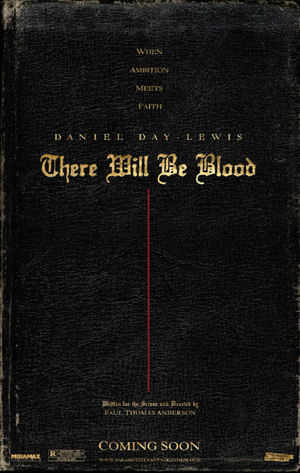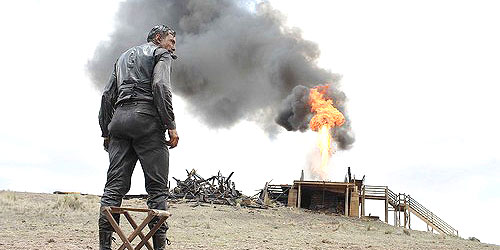Paul Thomas Anderson’s Magnolia is one of my all-time favorite films. Christian themes play no small part in the movie which includes prayer, quotes from Scripture, and the re-creation of a very biblical plague.  (For a fantastic discussion about the Christian themes in Magnolia, visit The Fire and the Rose‘s A Reflection on the Cross through Paul Thomas Anderson’s Magnolia.)
(For a fantastic discussion about the Christian themes in Magnolia, visit The Fire and the Rose‘s A Reflection on the Cross through Paul Thomas Anderson’s Magnolia.)
Religion plays an even bigger role in Anderson’s newest film, “There Will be Blood.” I saw the movie this weekend and have been reflecting on a number of its themes. Apart from Daniel Day-Lewis’s incredible performance, what has most lingered in my mind is the film’s biblical elements.
The movie traces the unholy alliance of oil man Daniel Plainview, with rabid plains preacher Eli Sunday, as they both forge futures of their own greedy devices. Sunday, played creepily well by Paul Dano, is an exercise in religious fanaticism — the wild-eyed, frothing, prophet of The Church of the Third Revelation, twists Scripture and manipulates the people around him with sinister calculation. Even while extracting demons, we are forced to wonder who is more “possessed,” Sunday or the maniacal oil man. And it’s precisely this portrayal of a wicked preacher that has evoked such harsh response from Christian critics.
Take for instance Phil Boatwright’s review at Preview Online:
There are two main characters. The filmmaker does his best to spotlight one of them as a snake oil hypocrite Christian, without including even the slightest portrait of someone else living a life of religious devotion. This leaves the audience with the assumption that those who follow Christ are either phonies or morons.
Then there’s Ted Baer’s Movie Guide:
The realistic, gritty atmosphere created by screenwriter/director Paul Thomas Anderson and actor Daniel Day-Lewis as Daniel Plainview is tremendous. It is practically ruined, however, by Anderson’s evil caricature of Eli, the revenge-minded preacher, and the over-the-top, unrealistic performance of Paul Dano as Eli. In fact, THERE WILL BE BLOOD is one of the most mean-spirited, anti-Christian, superficial, and poorly played portrayals of religion ever created in movie history. God knows there have been plenty of insincere, sinful leaders in the Christian church, but there have also been many good Christians who have exposed and opposed such false leaders. The short length of most feature films often require stereotypes, even negative ones, to tell a good story, but when they are so mean-spirited, superficial and poorly played as this one is, they appeal only to narrow-minded bigots with an ax to grind, whose mental faculties and hearts have been poisoned by their sinful misanthropic prejudice.
The reviewer goes on to label the film the “Worst Anti-Christian Stereotype of the Year.”
But while some Christian reviewers are calling this “one of the most mean-spirited, anti-Christian, superficial, and poorly played portrayals of religion ever created in movie history,” others are calling it the best film of the year. Jeffrey Overstreet, in his review of the movie at Christianity Today, says “There Will Be Blood is a masterpiece.” Brett McCracken at The Search writes, “There Will Be Blood is the best film of 2007.” Furthermore, the movie has made almost every Top Ten list out there — “Christian” or not.
But why the disparity of opinions?
I’m guessing it’s far more than the subjective nature of film that has created this divide. Reviews like the ones above are indicative of a knee-jerk reaction that exists among many Christian filmgoers and critics, a moralistic lens that inevitably forces one to “strain at gnats and swallow camels.” Rather than ponder the deeper implications of the piece, these folks are busy counting cuss words and chafing at perceived stereotypes. But perhaps even more disturbing than the narrow perspective afforded by this view, is the suggestion that the movie will “appeal only to narrow-minded bigots with an ax to grind, whose mental faculties and hearts have been poisoned by their sinful misanthropic prejudice.” In this, I can’t help but wonder if the reviewer isn’t reinforcing the very caricature he is decrying.
Of a far more even-handed (perhaps even “Christian”) disposition, is the reviewer at Libertas who writes:
This isn’t an anti-Christian film, it’s an anti-fake-Christian film.
And Overstreet, in his review of the film at Christianity Today correctly notes,
Anderson’s movie is not a condemnation of Christian faith. In fact, on a deeper level it’s consistent with Christ’s teaching about the nature of ego and greed.
While Anderson has polarized audiences in the past with his pictures, it’s surprising how much of a rise the Pentecostal prophet of There Will Be Blood has got out of some folks. Fact is, there ARE many manipulative preachers and many examples of false prophets in the Scripture. The caricature of the greedy false prophet, Eli Sunday, may be a bit over the top, but it is not without its symmetry in real life. There Will Be Blood dramatizes the madness that wealth, power, and even faith, can propel one towards when left unchecked. However, the gulf between Christian reviewers here is indicative of a much bigger divide about the nature of art and faith.















While I don’t object to the portrayals of hypocrites in the church leadership, just once (and I haven’t seen this film) I’d like to see a true portrayal of a Christian leader/layman as a humble man/woman who triumphs in the face of all the corruption around him. I’m not criticizing this character or its screen performance in this particular film. I’m just saying it gets so tedious to continue to see the supposed “Christian” as the “evil one”.
Nicole, while I’ll agree that Christian caricatures are still wildly inaccurate in Hollywood films, there are far too many positive portrayals for us to continue to rage against the machine. Last week I finally watched “Amazing Grace” and was floored by the portrayal of William Wilberforce. It was fantastic! Films like “Bella,” “Chariots of Fire,” “Luther,” “To End All Wars,” “The Mission,” “Shadowlands,” “End of the Spear,” “Signs,” “The Exorcism of Emily Rose” — and lots more — all have a reasonable, if not favorable, portrayal of a believer.
To be fair, the gist of “There Will Be Blood” is not to trounce Christians, but to show how greed and jealousy and ambition destroy people. While Day-Lewis’s oil man is pitted against the preacher, neither is made out to be better, or worse, than the other. They are equally falling from grace.
Nice post Mike. I too find it disturbing that, as you note, “the gulf between Christian reviewers here is indicative of a much bigger divide about the nature of art and faith.” I think it all comes down to the very different ways Christian critics approach cinema. Some (like Baehr) view film from a defensive battle-mentality (i.e. Hollywood is always out to get Christians or portray them in the most unflattering lights). This is based on their placement of cinema as some sort of weapon to be wielded–for good or ill. Critics like myself or Jeffrey Overstreet, however, do not think of cinema as a mechanism to be used for some ulterior motive. It is chiefly an ART form and should be considered as such. If a Christian is portrayed negatively in film, our first instinct is not (like Baehr) to take it as an attack… but to assess it in terms of the film’s larger framework as a work of art aiming to expose truth. And sometimes the truth is a bit unsettling.
“If a Christian is portrayed negatively in film, our first instinct is not (like Baehr) to take it as an attack… but to assess it in terms of the film’s larger framework as a work of art aiming to expose truth. And sometimes the truth is a bit unsettling.”
I understand that this is a general statement which is supported by good filmmaking. However, as a rule, I must take exception to the basis of this statement. In Christian fiction and Christian filmmaking, writers and producers are accused of being agenda-driven rather than “exposing truth”. I would suggest to you that there are a number of left-wing agenda-driven films in recent times which do not translate either to “art forms” or as “exposing truth”. While being in “attack mode” when a Christian caricature is portrayed as a reality or a Christian theme is slandered serves no purpose, neither does condoning irrational or disrespectful portrayals of such things as “art” and therefore acceptable.